Modernizing Sponsored Research
Office of Research and Sponsored Projects
To provide responsive, compliant, and best-in-class operations on behalf of the U-M research enterprise, the Office of Research and Sponsored Projects (ORSP) has been working to reimagine current workflow and is launching a realignment.
ORSP will realign to strengthen sponsored research operations
Based in the Office of the Vice President for Research, ORSP last year reviewed and submitted 7,500 research proposals, managed activity on 2,700 sponsored awards, and negotiated nearly 2,000 contracts and agreements on behalf of U-M to support faculty and staff across disciplines.
ORSP’s realignment is necessary to modernize, enhance, and elevate operations; to best position its team and operations for anticipated growth, and to strengthen ORSP’s overall support of the University of Michigan research community.
 Progress Updates
Progress Updates
Stay tuned on ORSP’s progress throughout the realignment.
December 2024
People & Processes
- Our Contracts team is in place! See details in this announcement on team formation progress . This is an active phase of our realignment and a milestone for the research community, positioning us to operate at an elevated level, enabling us to support higher volumes of research with greater efficiency.
- Welcome Lora Krueger, Manager, Sponsored Project Coordination
November 2024
People & Processes
Announcing the following positions filled. Welcome and congratulations. See our latest org chart.
- Lena Matthias, Pre-Award Officer
- Cindy Cowen, Pre-Award Officer
- Moonson Eninsche, Assoc. Pre-Award Officer
- Jessica Spurgeon, Assoc. Pre Award
- Lizzie Howard, Pre-Award Lead
- Tracy Schwab, Senior Business Operations Support
October 2024
People & Processes
Announcing the following positions filled. Welcome and congratulations. See our latest org chart.
September 2024
People & Processes
Announcing the following positions filled. Welcome and congratulations. See our latest org chart.
August 2024
People & Processes
- Welcome, Daniela Marchelletta, Assoc. Director, Award Management (8/8)
July 2024
People & Processes
- Welcome Eric Ward, Asst. Director, Unfunded Agreements (7/15)
- Welcome Sam Gibbons, Assoc. Director, Pre-Award (6/24)
June 2024
May 2024
People & Processes
- ORSP New Job Series updated with links to U-M Career Navigator (5/3/2024)
Systems
- ORSP will implement a Contract Lifecycle Management (CLM) Solution (5/2/2024)
April 2024
People & Processes
- Fabio Chimienti named Senior Project Manager (4/15/2024)
- Erin Kingsley named
Manager, Pre-Award Team (4/8/2024) - Emily Baxter named new Director, Contracts (4/1/2024)
March 2024
- Realignment shared in University Record (3/15/2024)
- Realignment shared in March 2024 issue of VPR Update (3/14/2024)
- ORSP launches realignment website portal at https://research.umich.edu/orsp-realign (3/13/2024)
- ORSP’s realignment plans updated to Research Associate Deans (RADs) (3/13/2024)
- Karen Alameddine named new Director, Proposals and Award Management (3/12/2024)
February 2024
Socialize realignment planning with key constituencies:
- Research Administrators’ Network (RAN) – ORSP Realignment Presentation (2/27/2024)
- Research Administration Advisory Council (RAAC) Committee at Large (CAL) (2/20/2024)
- RAAC Executive Committee (2/13/2024)
- OVPR Leadership
- ORSP Staff
- ORSP Leadership
January 2024
Select and Appoint New Leadership
- Director, Operations & Administration (1/8/2024)
- Associate Director, eRA Systems (1/11/2024)
Staff
- As ORSP is positioned to launch a Realignment, it has 70 full-time equivalent (FTE) staff members, and is fully-staffed at pre-realignment/current state structure.
- ORSP will expand to 81.
Soft-launch Pre-Award team
- Soft-launch of ORSP’s new Pre-Award team. While ORSP staff members manage all three business lines, the newly formed Pre-Award Team is trained and begins to assume responsibility for more proposal activity. (1/29/2024)
- Finalize organizational chart, timing, headcounts, rollout of teams, and establish new positions with U-M HR approved titles. (1/8/2024)
November - December 2023
ORSP begins reimagining workflow and processes toward a model that will modernize, enhance, and elevate operations.
- Hire Executive Director, Sponsored Project Operations – Andrea Anderson (11/1/2023)
- Assistant Vice President for Research-Sponsored Projects, Shandra White, and Executive Director Andrea Anderson work with consultants to review and refine business processes, develop detailed project management plans for change management, communications, systems, training, and adoption.
Realignment Overview
The realignment will require a change in how we work with research administrators and faculty. We will follow a carefully established project plan to move into that new structure. There will be periods of adjustment as we implement these changes.
Those changes will make it possible to meet our goal and ensure that we can provide the service level required for a responsive, compliant, and best-in-class operation in an evolving research enterprise.
We will rollout over 13 months, in a phased approach, adhering to the detailed and multi-faceted project plan.
Modernization Will Address
|
|
Current State |
Future State |
|
01 |
Inability to effectively prioritize work (i.e.,) proposals over contracts); failed hand-offs; |  |
|
02 |
Delayed responsiveness and communication; |  |
|
03 |
Delays experienced by faculty and sponsors. |  |
|
Redesigning our workflow and business processes will streamline business functions to align with current and anticipated needs and growth.

Modernize
ORSP will scale our structure and functions to align with the university’s expanding research portfolio and the complexity of the work. Research Administrators will work three teams, or business lines, all of which ensure and safeguard compliance.
-
-
- Pre-Award Team: Proposal Review, Approval, Submission, & Post Submission Actions
- Contracts & Agreements Team: Contract, Award Review, Negotiation, Acceptance
- Award Team: Award/Project Management (non-financial post-award: award acceptance, modifications, technical/progress reports, close-outs, sponsor interactions/communications/ approvals)
-
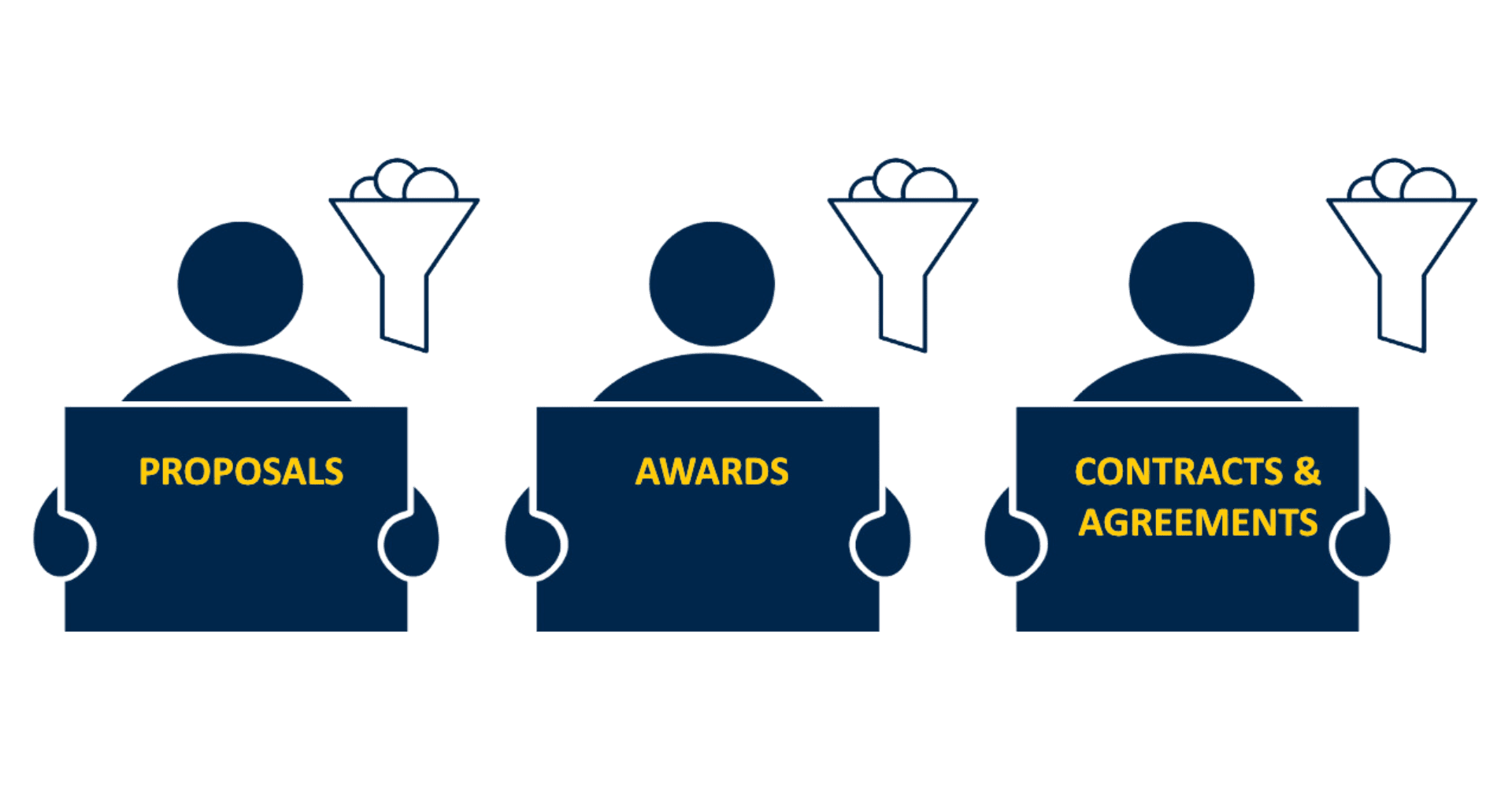

Transition Plan
ORSP will implement its realignment strategy over the next 13 months, utilizing a phased approach that aims to enhance structures and expand staff, roles, processes, training and systems.

Enhance
-
-
- Develop and deliver training.
- Streamline work and business lines.
- Expand staff to 81 full-time equivalents.
-

Elevate
-
-
- Departments and RAs work with three separate teams of experts (called Sponsored Project Officers) who focus on proposals, contract negotiation, and award management.
- ORSP Staff can prioritize work based on the same criteria and focus on timely responsiveness.
- Primary business lines allow for fewer handoffs, reduced burnout, and optimized organizational efficiency.
- Prioritize similar work using same criteria, timely responsiveness.
- Realize benefits: Improved turnaround times with fewer handoffs, reducing burnout, and optimizing organizational efficiency.
-
|
Defining Organizational Model Success |
||||||
| Goal | Create a more effective organization that is scalable, differentiates roles to develop domain expertise, establishes practices that support more timely outcomes while maintaining compliance, and meets service level agreements. | |||||
| Roles | Growth & Retention | Customer Service | Training | Efficiency | Oversight & Monitoring | |
| Elements of a well-defined model. |
|
|
|
|
|
|
FAQs
Why should ORSP realign?
In our previous structure, each staff member in ORSP has been responsible for concurrently managing actions from three business lines. There are numerous hand-offs within ORSP to complete actions for a single transaction. Impact: Inability to effectively prioritize work; failed hand-offs; delayed responsiveness and communication; delays experienced by faculty and sponsors. Staff experience burnout.
Will ORSP expand staff?
Yes, the ORSP organization will expand to 81 positions, adding 11 positions from our structure in April 2023. At that time, ORSP had already added 61 positions for a total of 69, in response to a staffing benchmarking study conducted with other research universities.
What is the scope of the new leadership roles and positions within ORSP?
The new leadership roles will provide opportunities for growth in leadership. They help ensure we are appropriately guiding and supporting the team, responsive to direct reports, keeping a team informed, and mitigating issues that may arise with a complex project or project team need. In addition, managers have time to work on process improvements and contribute to projects that streamline operations
When is this taking effect?
This will take place in phases over a 13-month period.
New Leadership Appointments
 Erin Kingsley
Erin Kingsley
Manager, Pre-Award
Interviewing / Active Recruitment
Title (U-M Job ID)
- Manager, Sponsored Project Coordination (251907)
- Sponsored Project Officer, Award Management (3) (256114)
- Director, Research Administration Strategy (252088)
- New Job Series with Career Navigator Links

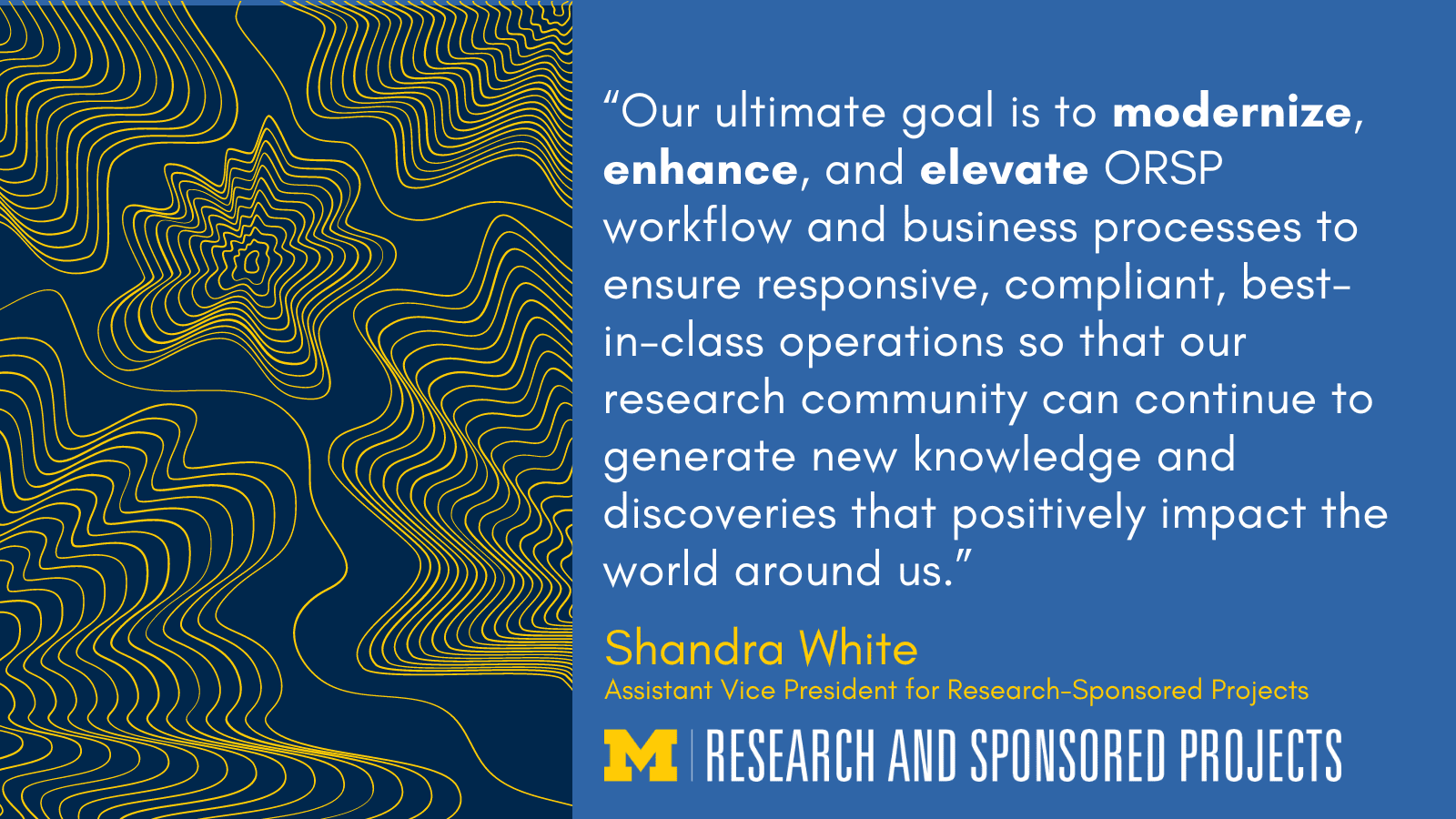
 Progress Updates
Progress Updates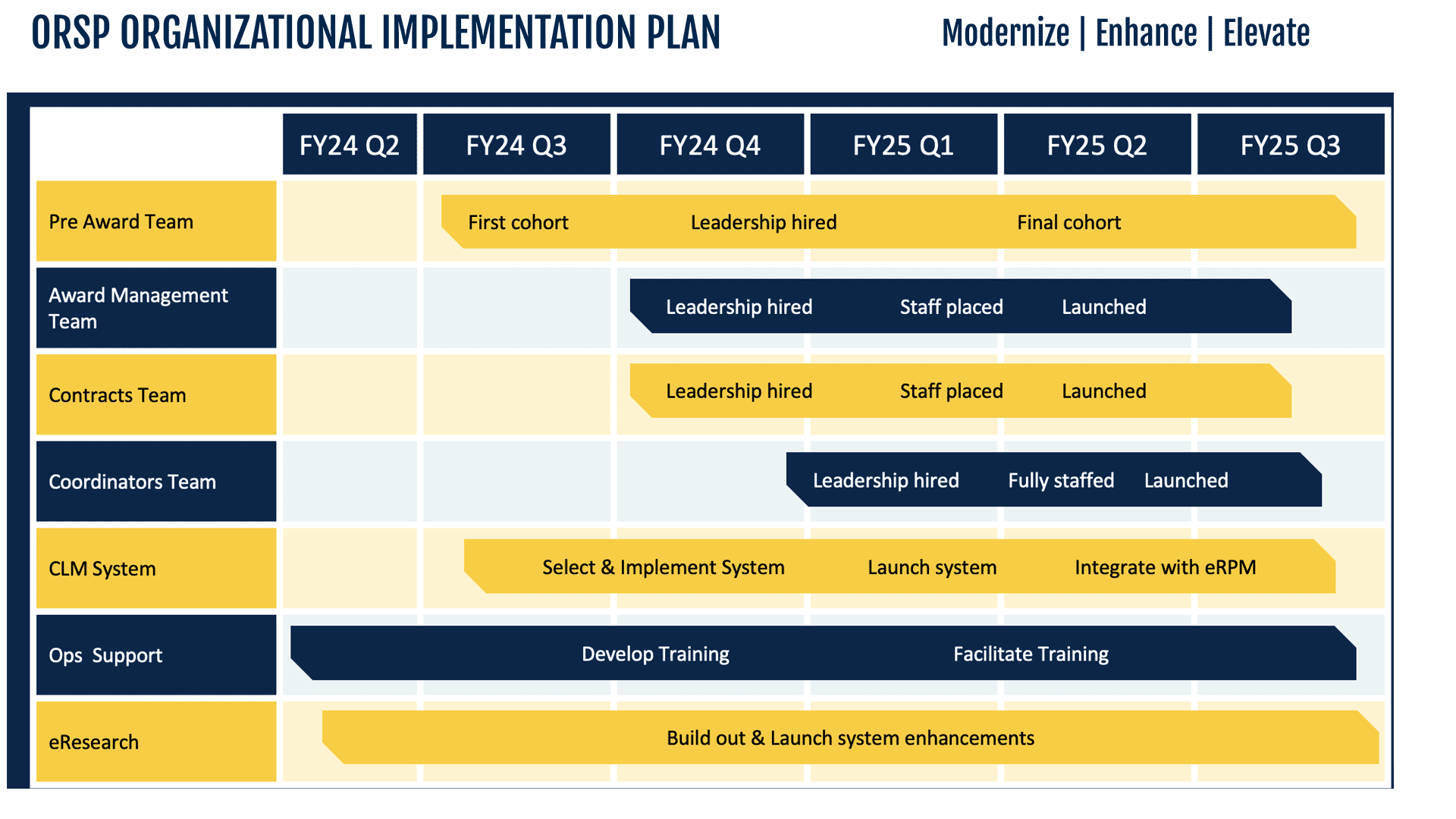

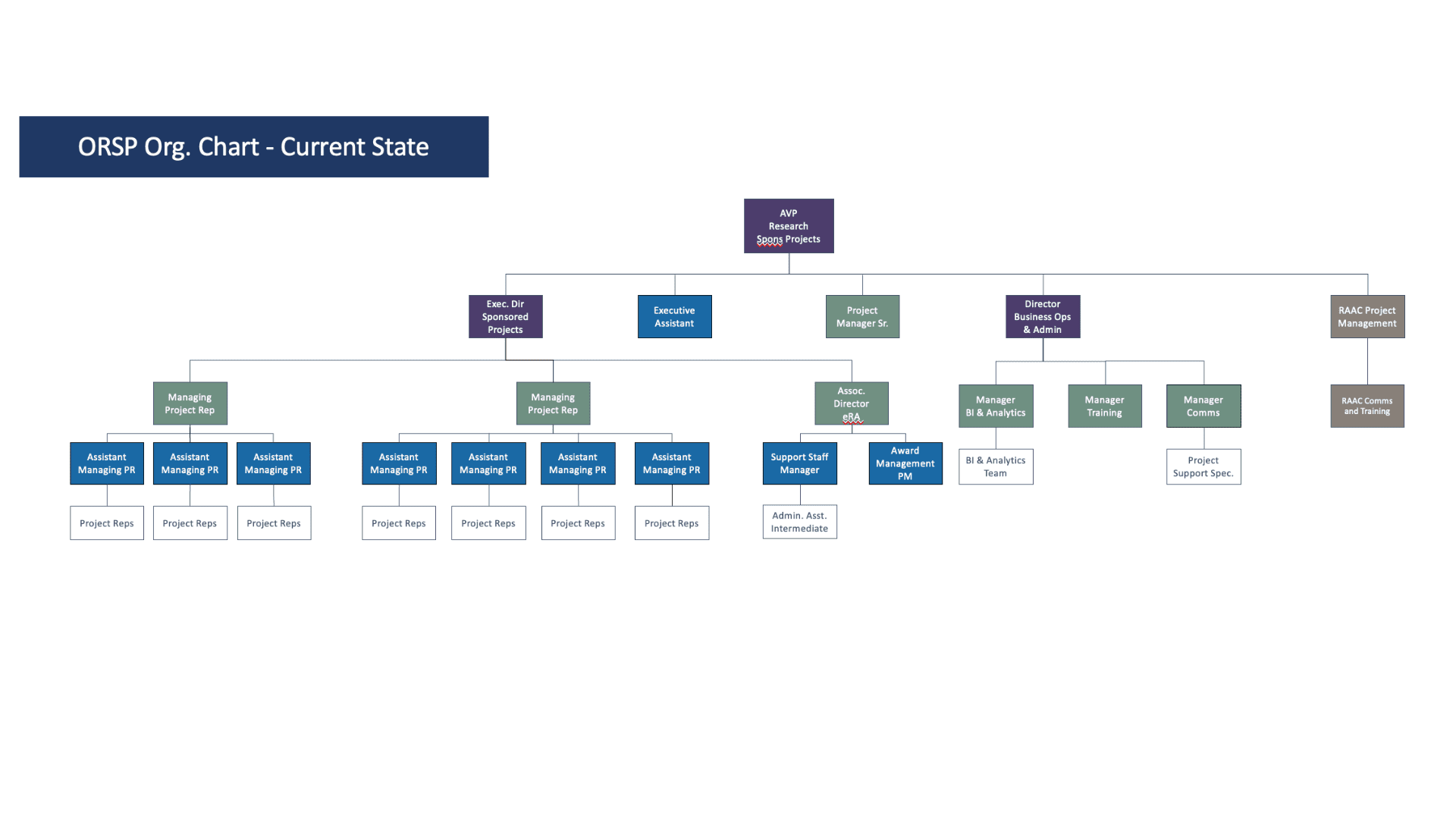
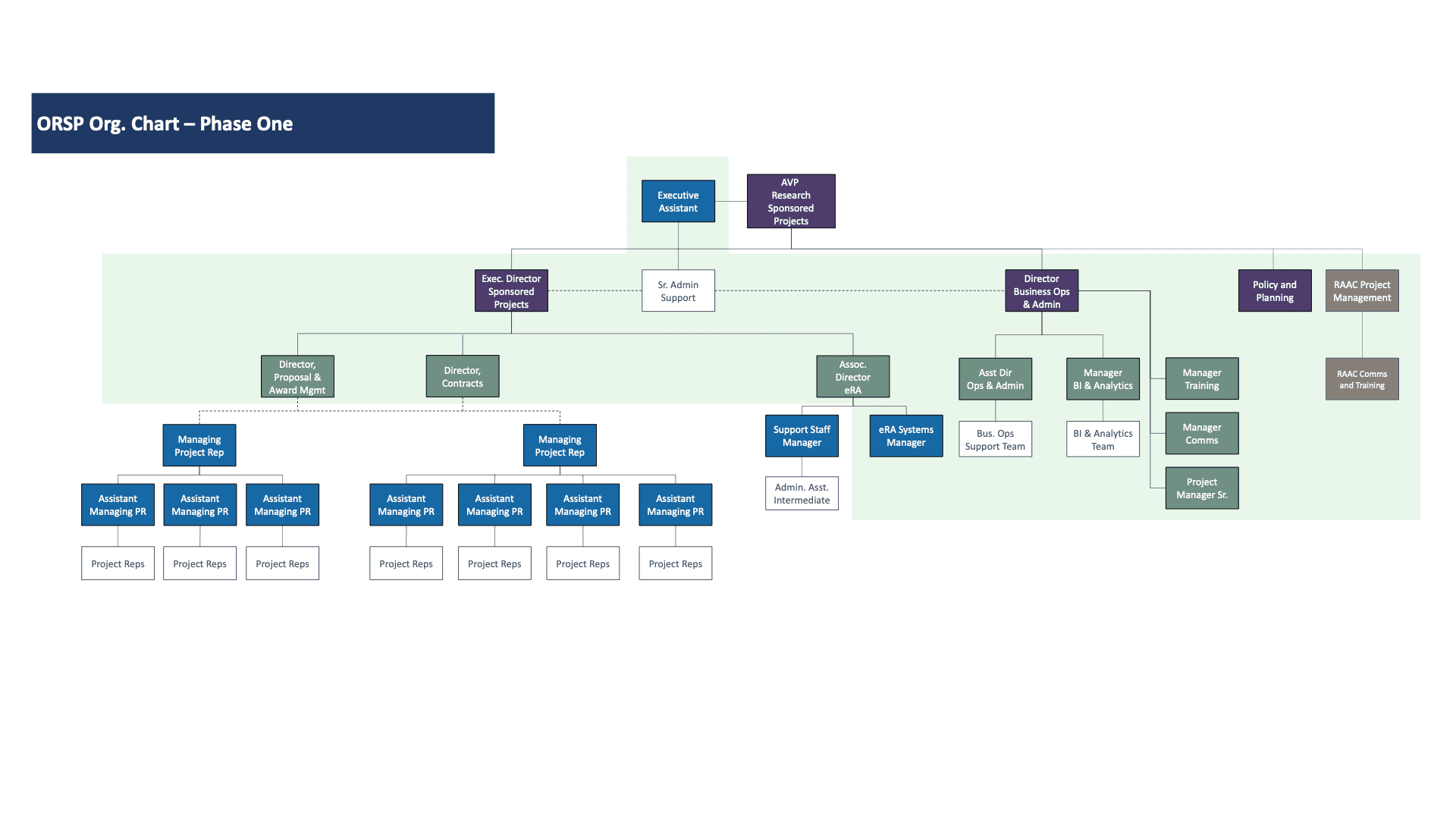
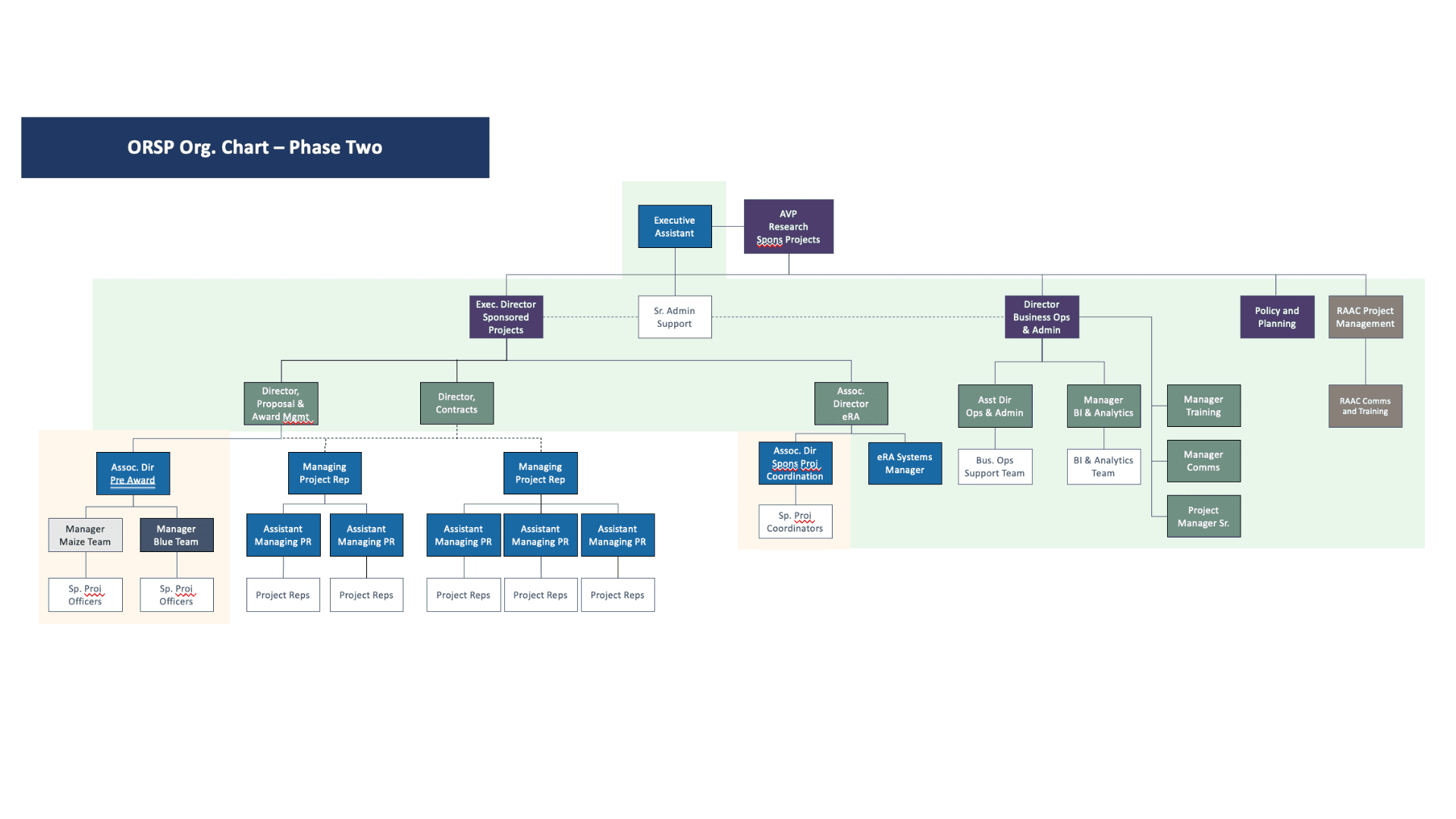
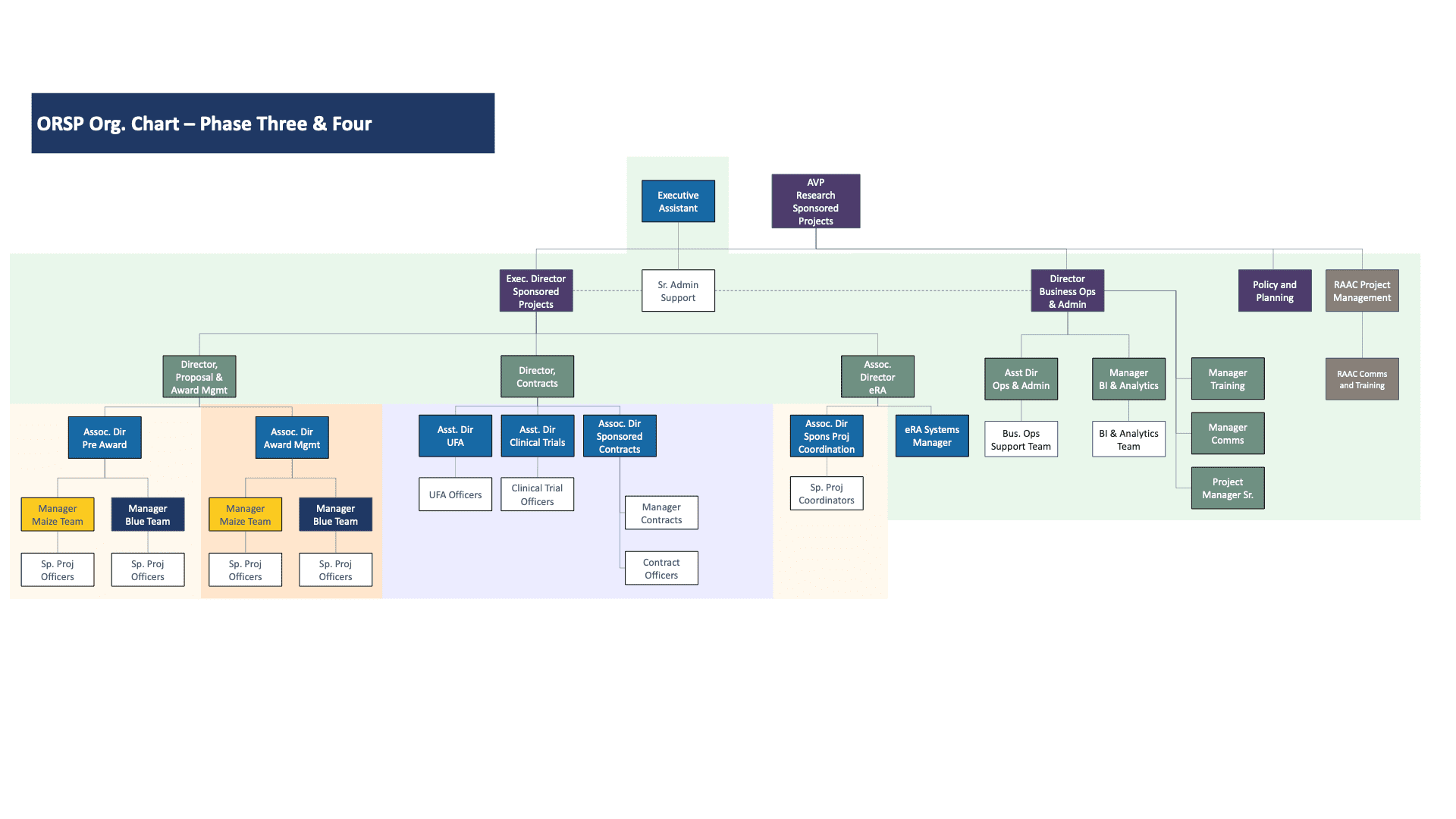






 Erin Kingsley
Erin Kingsley








